If you’ve ever wondered what turkeys can eat and how to ensure they have a healthy diet, you’ve come to the right place! As a turkey enthusiast, I understand the importance of keeping our feathered friends happy and content. That’s why I’ve put together this comprehensive guide to what turkeys can eat, with a focus on promoting their overall well-being.
When it comes to turkeys’ nutritional needs, there are some key considerations to keep in mind. While commercial turkey diets are often designed for productivity and profitability, sanctuary turkeys require different dietary considerations. For example, while industry recommendations suggest higher protein diets for turkeys, sanctuary residents actually benefit from lower protein diets to promote health and longevity.
Commercial turkey foods typically have a protein content of 20% or higher, but for turkeys used for breeding, a diet with 12-14% protein is recommended to prevent obesity. Calcium content is also important, especially for laying turkeys, whose diets contain higher levels of calcium. For non-laying turkeys, maintenance diets like Purina Game Bird Maintenance Chow and Roudybush are popular choices.
In the wild, turkeys have a varied diet depending on the season. They enjoy feasting on acorns, seeds, berries, insects, reptiles, and plant foliage. However, there are certain foods that should be avoided when feeding turkeys. These include dairy, onions, avocados, fruit pits, tomato and eggplants, rhubarb leaves, chocolate, high-sodium foods, citrus, and caffeine products, as they can be harmful to their health.
For domestic turkeys in captivity or agriculture, commercial feeds formulated for game birds or poultry are often used. These feeds are typically supplemented with corn and grains. It’s important to remember that turkeys have a natural foraging behavior, constantly scratching the ground and pecking for food.
Factors such as season, geography, and age also play a role in turkeys’ dietary needs. To attract wild turkeys to your backyard, you can provide ground feeding areas or large, low platform feeders with cracked corn, millet, milo, wheat, oats, or other seeds and grains. Planting oak, beech, grapes, cherry, crabapple, and hackberry trees can also provide a natural food source for wild turkeys.
Remember to minimize the use of herbicides and insecticides around wild turkeys, as they forage freely and can help control insect populations. By understanding turkeys’ nutritional needs and providing them with appropriate diets, we can ensure that they are well-fed and happy.
Key Takeaways:
- Sanctuary turkeys benefit from lower protein diets for health and longevity.
- Commercial turkey diets have higher protein content, but breeding turkeys should have a lower protein diet.
- Calcium is important for laying turkeys, while maintenance diets are a good choice for non-laying turkeys.
- Avoid feeding turkeys dairy, onions, avocados, fruit pits, and high-sodium foods.
- Wild turkeys have a varied diet depending on the season and forage for acorns, seeds, berries, insects, reptiles, and plant foliage.
Understanding Turkeys’ Nutritional Needs
Turkeys have specific nutritional needs that should be met to ensure they maintain a healthy and balanced diet. While most information focuses on commercial turkey diets for productivity and profitability, it is important to consider the unique requirements of sanctuary turkeys. Providing the right nutrients is essential for their well-being and longevity.
In the turkey industry, it is commonly recommended to feed turkeys higher protein diets to support their growth and development. However, for sanctuary turkeys, lower protein diets are preferred to promote health and prevent obesity. Commercial turkey foods typically contain 20% or more protein. However, turkeys used for breeding should be on a 12-14% protein diet to avoid excessive weight gain. It is crucial to understand the different protein needs for turkeys in different contexts.
Another critical aspect of turkeys’ nutritional needs is calcium content. Diets designed for laying turkeys contain higher levels of calcium to support eggshell production. For non-laying turkeys, maintenance diets with appropriate calcium levels are recommended. Popular options include Purina Game Bird Maintenance Chow and Roudybush. These diets provide the necessary nutrients for the turkeys’ overall health.
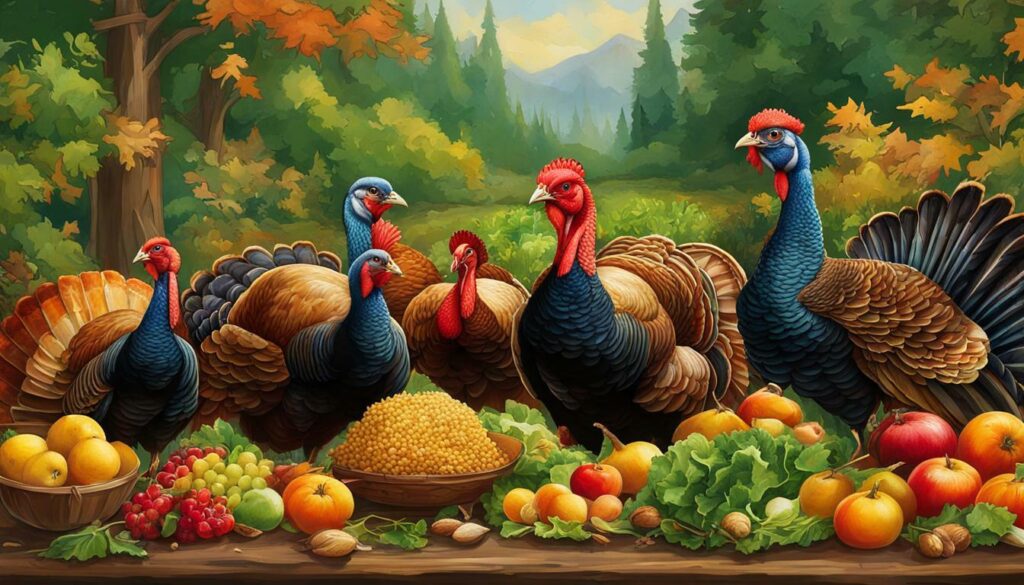
Understanding turkeys’ nutritional needs is crucial for their well-being. By providing the right protein and calcium content in their diets, turkeys can lead healthy and fulfilling lives. Whether it’s ensuring sanctuary turkeys receive an appropriate protein ratio or feeding domestic turkeys with commercial feeds plus supplemental corn and grain, meeting these nutritional needs contributes to their overall health and happiness.
Protein Requirements for Sanctuary Turkeys
While commercial turkey diets often recommend higher protein content, sanctuary turkeys have different requirements for a healthy and long life. To promote their well-being and longevity, it is important to provide sanctuary turkeys with lower protein diets. These diets help prevent obesity and other health issues that can arise from a high-protein diet.
The typical protein content in commercial turkey foods is around 20% or higher. However, turkeys used for breeding should be on a 12-14% protein diet to maintain a healthy weight and prevent complications. Obesity can lead to various health problems, including joint issues and decreased mobility.
When considering protein requirements for sanctuary turkeys, it is crucial to prioritize their overall health and well-being. By providing them with a lower protein diet, we can ensure that they live long, happy lives. Remember, a healthy diet goes a long way in supporting their growth and vitality.
Recommended Protein Content for Turkeys Used for Breeding
If you have turkeys used for breeding in your sanctuary, it is essential to know the recommended protein content for their diet. These turkeys require a slightly higher protein content compared to others. A protein content of 12-14% is recommended to support their reproductive health without causing unnecessary weight gain. It’s always best to consult with a veterinarian or animal nutritionist to ensure that you are meeting the specific dietary needs of your turkeys.
| Turkey Type | Recommended Protein Content |
|---|---|
| Turkeys for Breeding | 12-14% |
In conclusion, sanctuary turkeys have different protein requirements compared to commercial turkeys. For their health and longevity, it is crucial to provide them with lower protein diets. By understanding and meeting their specific dietary needs, we can ensure that sanctuary turkeys lead happy, fulfilling lives.
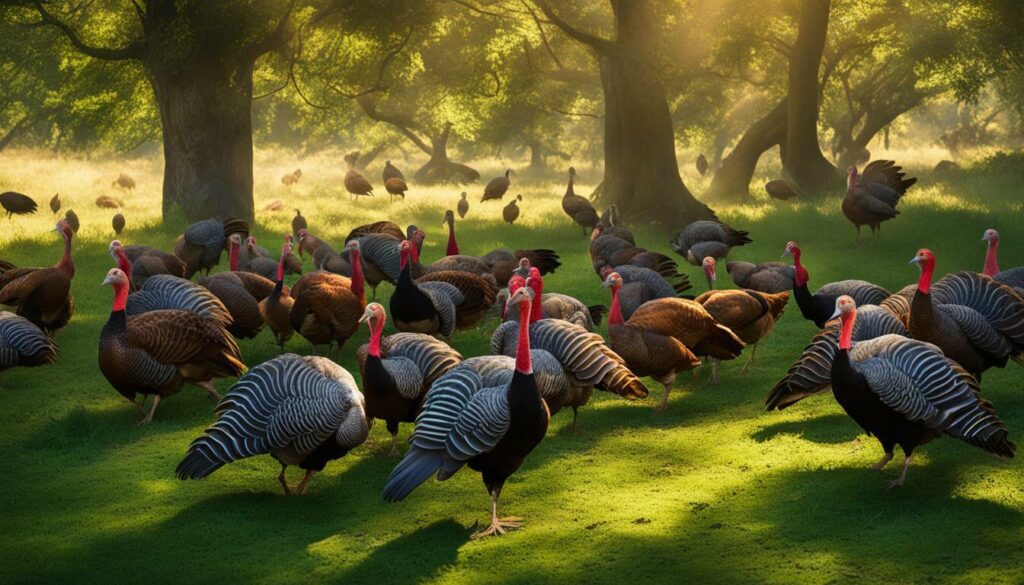
Calcium is an essential component of a healthy turkey diet, and it’s important to understand the importance of calcium content in their feed. A sufficient supply of calcium is crucial for turkeys, especially for laying turkeys, as it plays a vital role in eggshell formation. Diets designed for laying turkeys typically contain higher levels of calcium to meet their specific needs.
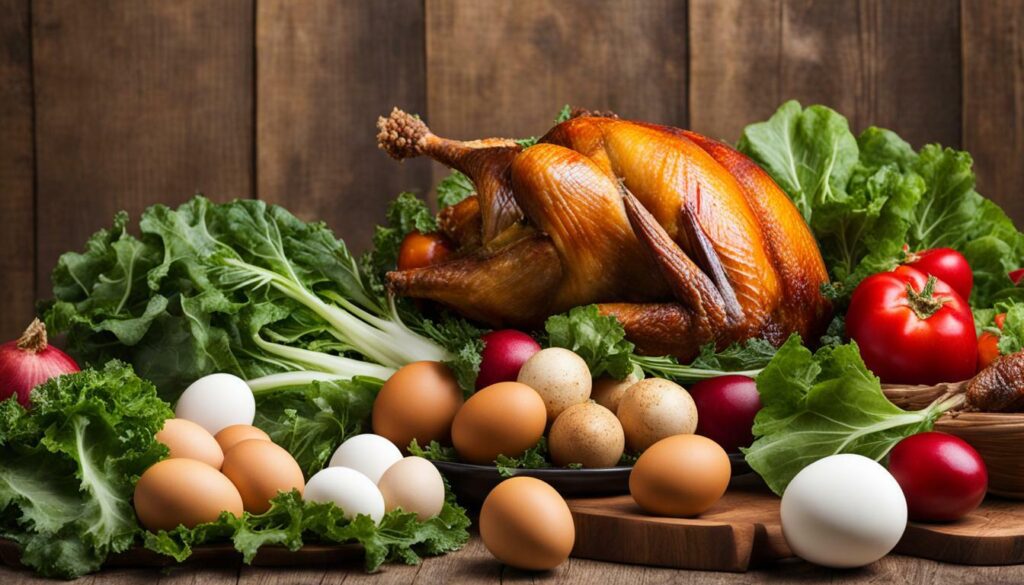
For non-laying turkeys, maintenance diets that provide the necessary nutrients without excessive calcium are recommended. Popular brands like Purina Game Bird Maintenance Chow and Roudybush offer well-balanced maintenance diets suitable for non-laying turkeys. These diets ensure turkeys receive the essential nutrients they need while avoiding the risk of excessive calcium intake that could lead to health problems.
| Brand | Calcium Content |
|---|---|
| Purina Game Bird Maintenance Chow | 1.5% |
| Roudybush | 1.3% |
It’s important to note that excessive calcium intake can lead to urinary calculi, a condition where calcium crystals form in the urinary system, causing blockage and discomfort. By selecting the right feed specifically designed for non-laying turkeys, you can ensure they maintain optimal health without any calcium-related complications.
Commercial Feeds for Domestic Turkeys
In captivity and agriculture, domestic turkeys are often fed commercial feeds formulated for game birds or poultry, along with corn and grain supplements. These feeds are specifically designed to provide the necessary nutrients for the turkeys’ growth and overall health. They are formulated with a balanced blend of proteins, vitamins, and minerals to support the turkeys’ specific dietary needs.
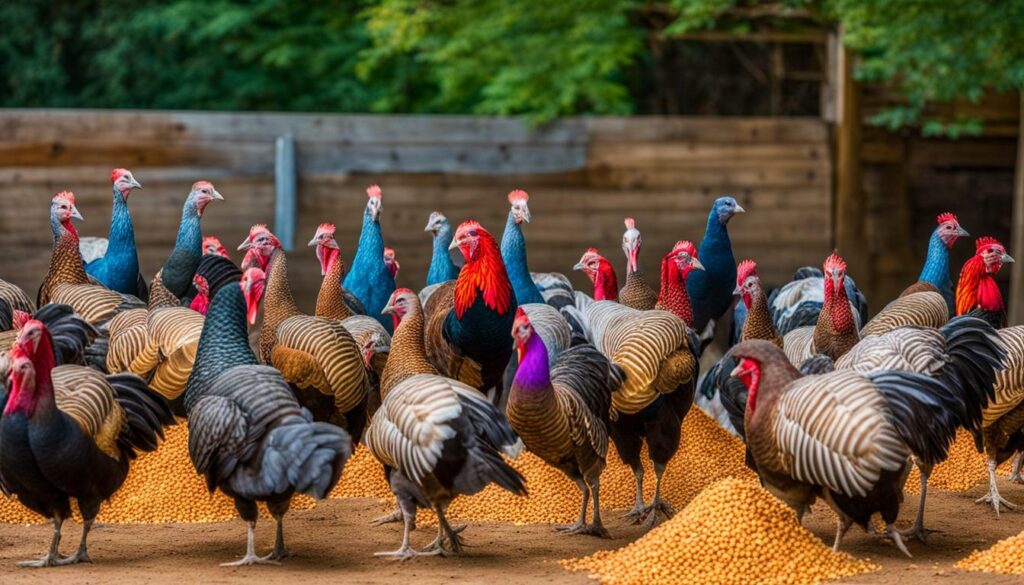
Commercial turkey feeds come in different forms, including pellets, crumbles, and mash. They are convenient to use and ensure that the turkeys receive a consistent and well-rounded diet for optimal growth and development.
When choosing a commercial feed for domestic turkeys, it is important to consider the specific requirements of the turkeys based on their age and purpose. For example, starter feeds are formulated for young turkeys to support their rapid growth, while grower and finisher feeds are designed for older turkeys to maintain their body condition and promote muscle development.
| Brand | Type | Protein Content (%) |
|---|---|---|
| Purina Game Bird Maintenance Chow | Pellets | 20 |
| Roudybush | Crumbles | 22 |
Alongside commercial feeds, turkeys should also have access to fresh water at all times. Water plays a vital role in digestion, nutrient absorption, and overall hydration, contributing to the turkeys’ overall health and well-being.
Foraging Behavior and Supplemental Foods
In addition to commercial feeds, domestic turkeys have a natural foraging behavior, where they scratch the ground and peck for food. This behavior can be encouraged by providing supplemental foods such as corn and grain. These food options not only offer variety in the turkeys’ diet but also stimulate their natural instincts and behaviors.
“Foraging is an essential part of a turkey’s daily routine. By providing supplemental foods like corn and grain, we can mimic their natural foraging behavior, keeping them engaged and active.”
While commercial feeds are the primary source of nutrition for domestic turkeys, it is important to remember that turkeys are opportunistic eaters and may also consume other items in their environment. Providing a balanced diet that includes commercial feeds, along with supplemental foods like corn and grain, ensures that domestic turkeys receive the necessary nutrients for their well-being.
Wild Turkey Diet in Different Seasons
Wild turkeys have a diverse diet that changes with the seasons, allowing them to adapt to the available food sources. During the spring and summer months, turkeys primarily feed on a variety of plant materials such as acorns, seeds, berries, and plant foliage. These provide essential nutrients and energy for their growth and reproduction. Turkeys will often forage in open areas, scratching the ground and pecking at plants to find their food.
In the fall, turkeys shift their focus to an abundance of acorns, which are a rich source of carbohydrates. Acorns provide a valuable food source for turkeys, helping them to build up fat reserves in preparation for the winter months. Additionally, turkeys may also consume other nuts, fruits, and seeds that are available during this time.
As winter approaches and the availability of plant materials dwindles, turkeys turn to alternative food sources. They rely more heavily on insects, including beetles, grasshoppers, and spiders, which provide a protein-rich diet. Turkeys may also consume reptiles, such as small snakes and lizards, as well as small mammals and amphibians when they can be found. These additional protein sources help turkeys maintain their energy levels during the colder months.
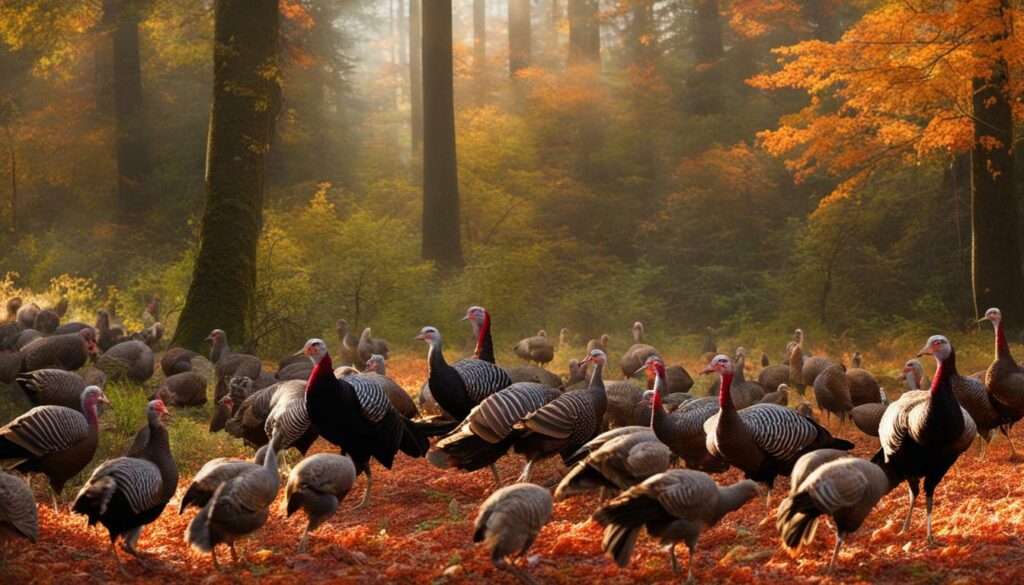
Understanding the seasonal changes in the diet of wild turkeys is essential for anyone interested in their conservation or observing them in their natural habitat. By providing a diverse range of food sources that mimic the natural diet of turkeys, we can help support their population and overall well-being.
Table: Seasonal Diet of Wild Turkeys
| Season | Main Food Sources |
|---|---|
| Spring/Summer | Acorns, seeds, berries, plant foliage |
| Fall | Acorns, nuts, fruits, seeds |
| Winter | Insects, reptiles, small mammals |
In conclusion, understanding the seasonal diet of wild turkeys is crucial for their survival. By providing a habitat that offers a variety of food sources throughout the year, we can support and conserve wild turkey populations. So, if you’re a turkey enthusiast or simply enjoy observing wildlife, take note of the changing seasons and the different foods that turkeys rely on to thrive.
Foods to Avoid Feeding Turkeys
While it’s essential to know what turkeys can eat, it’s equally important to be aware of the foods that can be harmful or even toxic to them. As turkey enthusiasts, we want to ensure the health and well-being of our feathered friends. So, let’s take a closer look at the foods that should be avoided when feeding turkeys.
1. Dairy: Turkeys are lactose intolerant, just like many other birds. Feeding them dairy products can cause digestive issues, including diarrhea and an upset stomach. So, avoid giving them milk, cheese, yogurt, or any other dairy products.
2. Onions and Avocados: These two common kitchen ingredients can be toxic to turkeys. Onions contain compounds that can lead to anemia and damage to their red blood cells. Avocados, particularly the skin and pit, contain a substance called persin, which can be toxic to birds, including turkeys.
3. Fruit Pits, Rhubarb Leaves, and Chocolate: Certain fruits like cherries, peaches, and plums have pits or seeds that contain traces of cyanide, which is poisonous to turkeys. Rhubarb leaves also contain toxic substances. Additionally, chocolate contains theobromine, which can be harmful to birds.
| Foods to Avoid | Reason |
|---|---|
| Dairy (milk, cheese, yogurt) | Lactose intolerant, digestive issues |
| Onions and Avocados | Toxic, can cause anemia and other health issues |
| Fruit Pits, Rhubarb Leaves, Chocolate | Cyanide, toxic substances, theobromine |
| High-sodium Foods | Can lead to dehydration and kidney problems |
| Caffeine Products | Can cause heart problems, hyperactivity, and nervous system issues |
4. High-sodium Foods: Foods with high sodium content, such as salty snacks or processed foods, can lead to dehydration and kidney problems in turkeys. It’s best to keep their sodium intake at a minimum.
5. Caffeine Products: Avoid giving turkeys caffeinated beverages like coffee, tea, or energy drinks. Caffeine can cause heart problems, hyperactivity, and nervous system issues in birds.
Remember, offering a safe and appropriate diet is crucial for the welfare of turkeys. By avoiding these harmful foods and providing a healthy diet, we can ensure that our turkey pals are clucking happily and living their best lives!
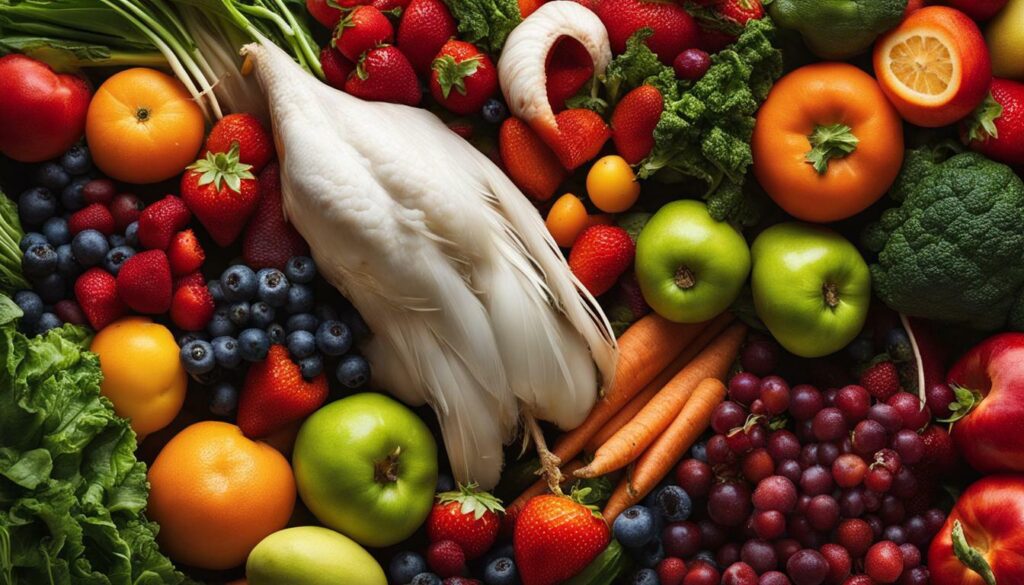
If you want to enjoy the presence of wild turkeys in your backyard, there are steps you can take to attract and feed them appropriately. Providing food for these magnificent birds not only allows you to observe their natural behaviors up close but also helps support their nutritional needs. Creating feeding areas and choosing the right types of food can make your backyard a turkey-friendly haven.
One way to attract wild turkeys is to set up ground feeding areas or large, low platform feeders. These feeding areas should be located in a quiet and undisturbed part of your yard. You can scatter cracked corn, millet, milo, wheat, oats, or other seeds and grains on the ground or on the platform feeders to entice turkeys to visit. Keep in mind that turkeys forage by scratching the ground and pecking for food, so creating a designated feeding space will make it easier for them to find the food you provide.
Planting trees that offer natural food sources can also help attract wild turkeys to your backyard. Oak, beech, grapes, cherry, crabapple, and hackberry trees are all great options. These trees provide acorns, berries, and other fruits that turkeys love to feast on. Not only will these trees enhance the beauty of your yard, but they will also provide a sustainable food source that turkeys can rely on throughout the year.
| Type of Food | Example |
|---|---|
| Cracked corn | 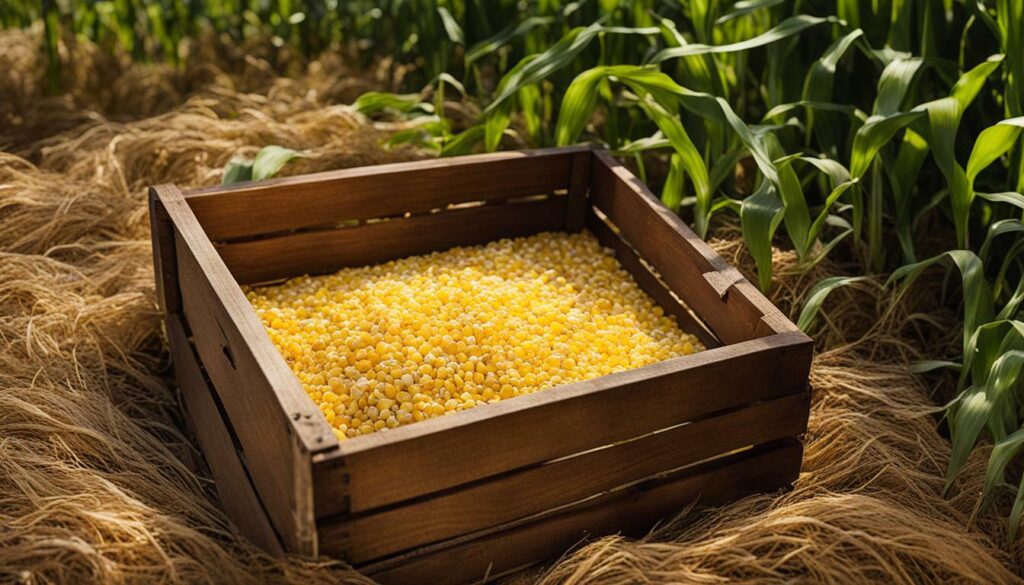 |
| Millet | 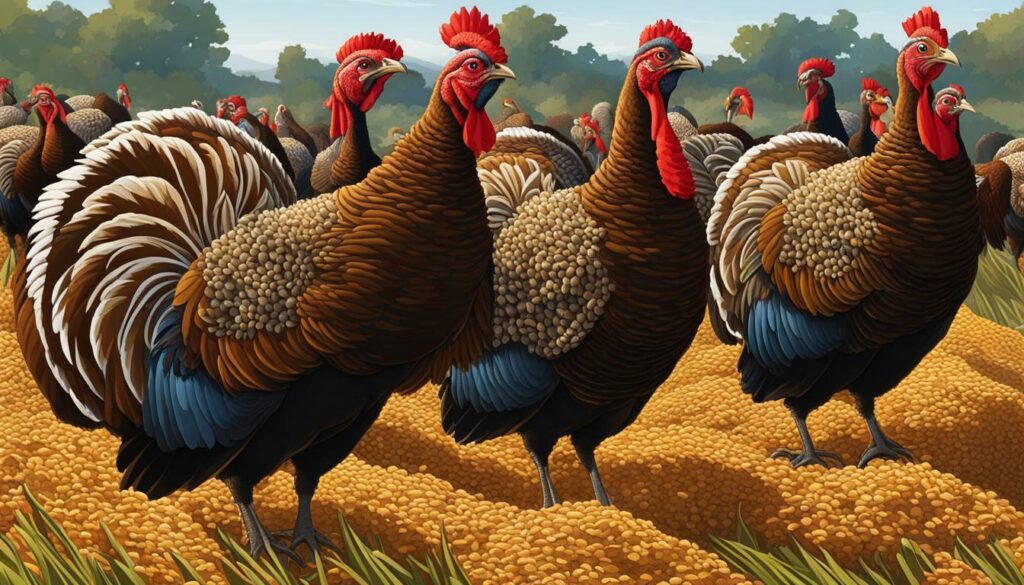 |
| Milo | 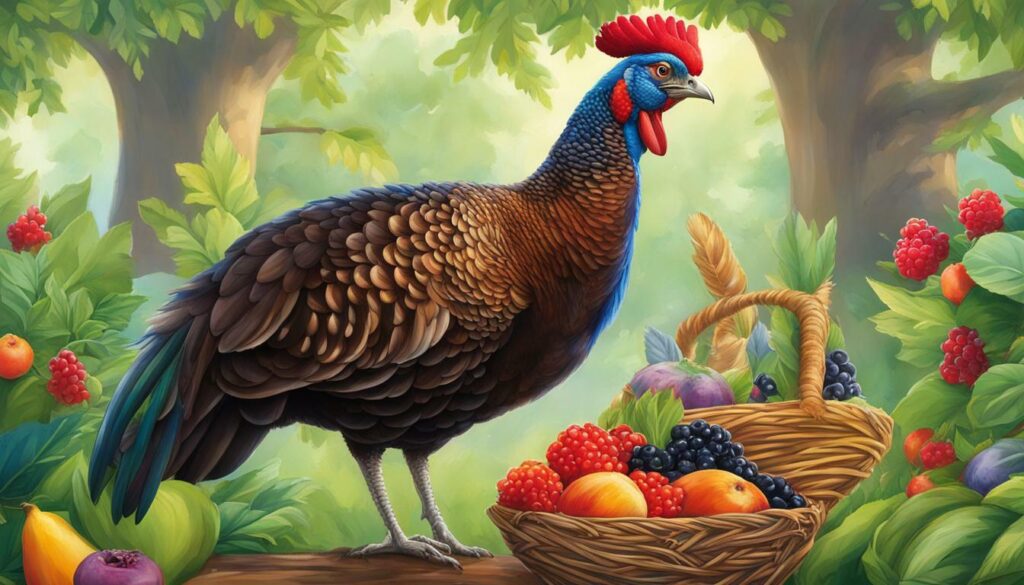 |
Remember to avoid using herbicides and insecticides in your yard, as wild turkeys forage freely and can control insect populations on their own. Minimizing chemical exposure will help protect the health of the turkeys and maintain the ecological balance in your backyard. By providing a safe and plentiful food supply, you can create an inviting habitat for wild turkeys and contribute to their well-being.
Considerations for Wild Turkey Diets
When considering the diet of wild turkeys, it’s important to take into account factors such as the season, geography, and age, as they play a significant role in determining their food sources.
Wild turkeys have a remarkable ability to adapt their diet according to the changing seasons. During the spring and summer months, they feast on a variety of vegetation, including grasses, seeds, and berries. As fall approaches, their diet shifts to include a greater amount of acorns and nuts from oak and beech trees. In the winter, when food sources are scarce, turkeys rely on their resourcefulness to survive, consuming whatever they can find, including plant foliage, insects, reptiles, and even small mammals.
Geography also influences the dietary choices of wild turkeys. Different regions offer distinct food options, depending on the availability of various plant species and the local climate. For example, turkeys in areas with abundant fruit trees may have a diet that consists more heavily of fruits compared to those in regions with grasslands or marshes.
Age is another factor to consider when it comes to wild turkey diets. Young turkeys, known as poults, have different nutritional requirements than adults. Poults rely more heavily on insects and small invertebrates during their early stages of development, gradually transitioning to a more plant-based diet as they grow older.
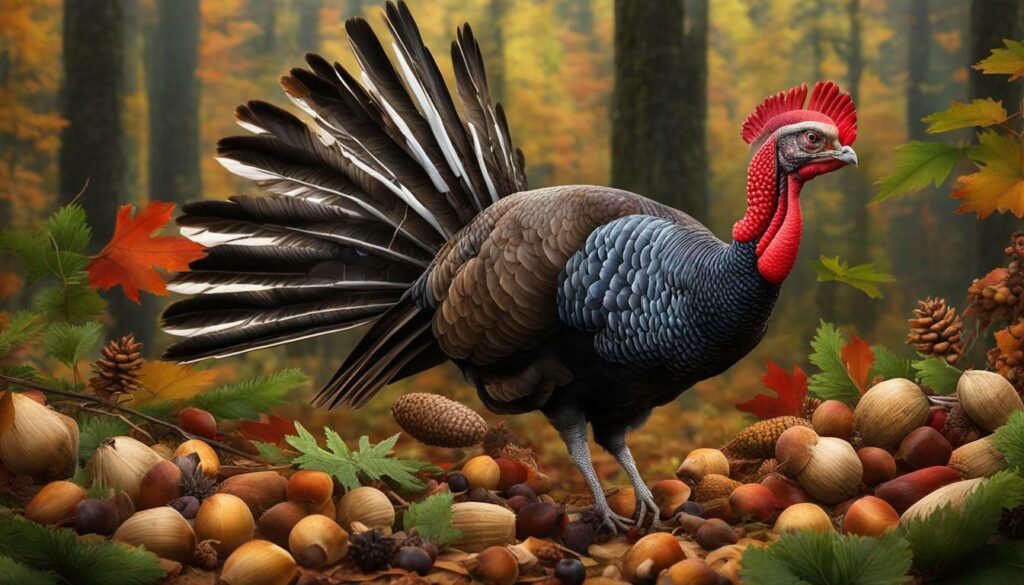
Providing Natural Food Sources for Wild Turkeys
If you want to support the diet of wild turkeys and create a habitat that attracts them, planting certain trees can provide a natural food source for them. These trees not only offer nourishment but also provide shade and shelter for the turkeys. When planning your landscape, consider including a variety of trees that produce food throughout the year.
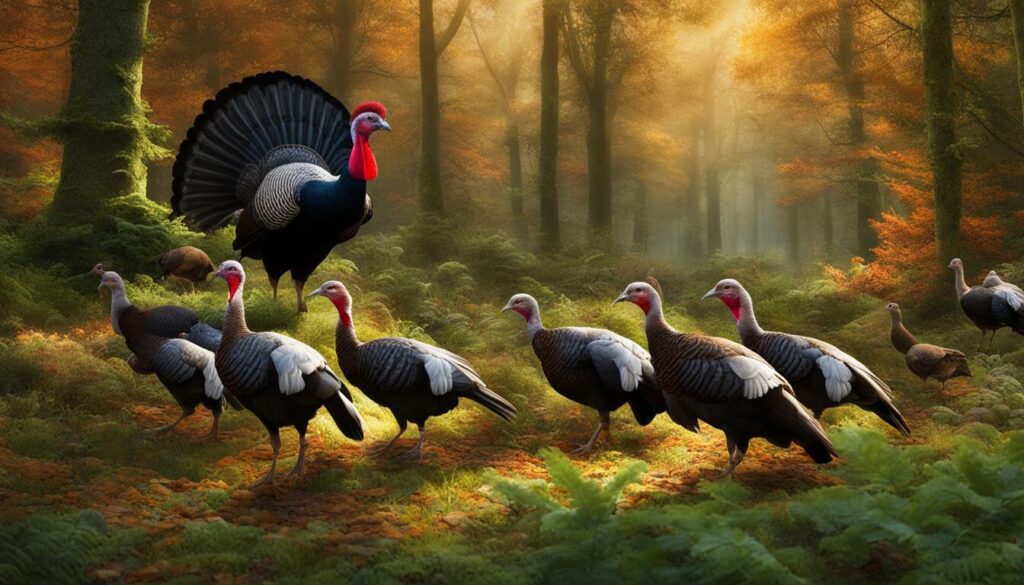
Oak trees are particularly favored by wild turkeys as they provide acorns, a staple in their diet. Beech trees are also a great choice, as they produce beechnuts that turkeys find irresistible. Grapes are another excellent addition, offering both fruit and leaves that the turkeys can enjoy. Cherry trees provide cherries, and their blossoms attract insects, creating a natural buffet. Crabapple trees produce small apples that turkeys feast on, while hackberry trees offer berries and seeds.
Creating a Natural Buffet with Trees
By planting a variety of these trees, you can create a diverse and abundant food source for wild turkeys. Not only will you be providing them with their essential dietary needs, but your yard will become a haven for these beautiful birds. Turkeys will roam and forage freely, enjoying the different offerings provided by the trees you have planted.
Remember to choose the right trees for your region and consider the space available for these trees to grow. Create an inviting environment by including a mixture of deciduous and evergreen trees, providing a year-round food source. Your efforts will be rewarded with the delightful presence of wild turkeys clucking happily as they feed on the bountiful harvest your trees provide.
| Tree Type | Food Source |
|---|---|
| Oak trees | Acorns |
| Beech trees | Beechnuts |
| Grapes | Fruit and leaves |
| Cherry trees | Cherries and insect-attracting blossoms |
| Crabapple trees | Small apples |
| Hackberry trees | Berries and seeds |
With these natural food sources at their disposal, wild turkeys can thrive and contribute to the rich biodiversity of your local ecosystem. Planting these trees not only benefits the turkeys but also enhances the beauty of your surroundings. So, create a welcoming habitat by planting these trees, and watch as wild turkeys visit your yard, forage beneath the branches, and enjoy the nourishment you have provided.
Minimizing Chemical Exposure for Wild Turkeys
To ensure the well-being of wild turkeys and maintain a healthy ecological balance, it’s vital to minimize their exposure to harmful chemicals such as herbicides and insecticides. These chemicals can have adverse effects on wild turkeys and disrupt their natural ability to control insect populations. By adopting responsible practices, we can help protect these magnificent birds and their habitat.
When it comes to herbicides, it’s important to avoid using them near areas where wild turkeys forage. Herbicides can contaminate food sources and pose a threat to turkeys’ health. Opt for alternative methods of weed control that are safe for wildlife, such as manual removal or the use of organic herbicides.
Insecticides are another concern, as they directly affect insect populations that turkeys rely on for food. Instead of reaching for chemical insecticides, consider natural pest control methods that target specific pests without harming beneficial insects. Integrated Pest Management (IPM) techniques can help strike a balance between pest control and preserving the natural balance of the ecosystem.
| Chemical | Harmful Effects on Turkeys |
|---|---|
| Herbicides | Contaminate food sources; disrupt foraging habits |
| Insecticides | Reduce insect populations; disrupt natural food chain |
“Protecting wild turkeys and their habitat is a responsibility we all share. By minimizing chemical exposure, we can preserve the delicate balance of the ecosystem and help ensure the well-being of these beautiful birds.”
In summary, minimizing chemical exposure is crucial for the health and survival of wild turkeys. By opting for natural alternatives to herbicides and insecticides, we can protect their food sources and the delicate balance of the ecosystem. Together, let’s make conscious choices that support the well-being of these captivating creatures.
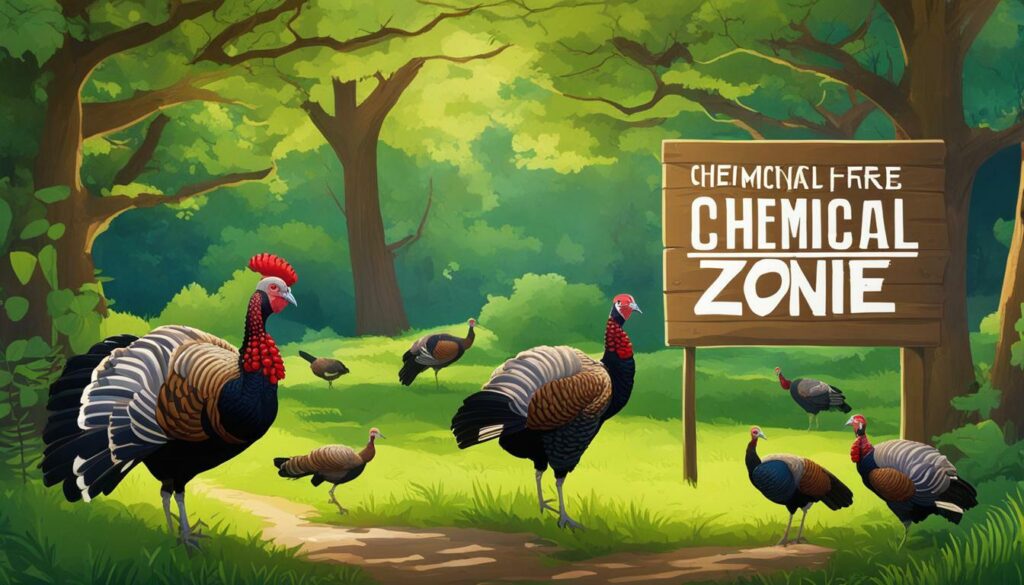
By understanding and meeting the nutritional needs of turkeys, avoiding harmful foods, and providing appropriate diets, we can ensure that our turkey pals stay well-fed and happy. Whether you have domestic turkeys or wild turkeys visiting your backyard, it’s crucial to provide them with a diet that promotes their overall health and longevity.
For domestic turkeys, commercial feeds formulated for game birds or poultry are the go-to option, supplemented with corn and grain. These feeds provide the necessary nutrients for productive and healthy birds. Remember, turkeys have a natural instinct to forage, so allowing them opportunities to scratch the ground and peck for food can keep them engaged and satisfied.
“Turkeys have a varied diet depending on the season, including acorns, seeds, berries, insects, reptiles, and plant foliage.”
When it comes to sanctuary turkeys, their specific needs differ from commercially raised turkeys. Lower protein diets are preferred to promote health and increase longevity. Opting for maintenance diets designed for non-laying turkeys, such as Purina Game Bird Maintenance Chow and Roudybush, can provide the balanced nutrition they require. These diets ensure that sanctuary turkeys are getting the right amount of protein and calcium to support their well-being.
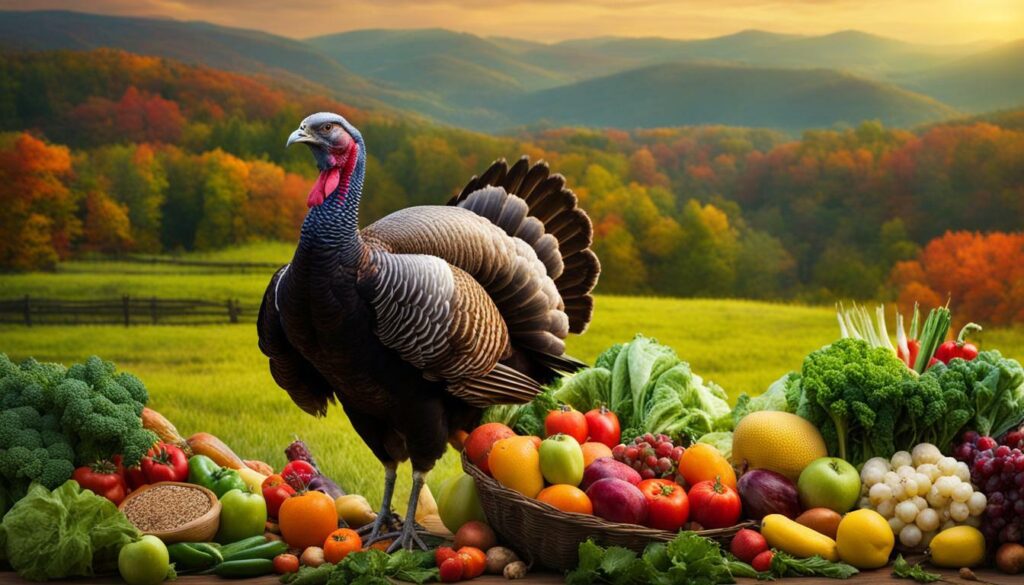
Feeding Wild Turkeys in Your Backyard
Attracting and feeding wild turkeys in your backyard requires a different approach. Ground feeding areas or large, low platform feeders can be used to provide a variety of seeds, grains, and cracked corn. Planting trees like oak, beech, grapes, cherry, crabapple, and hackberry can also offer natural food sources for these magnificent birds.
Remember, when feeding wild turkeys, it’s crucial to consider factors like season, geography, and age. Their natural food sources may vary depending on these factors, so adapting your feeding practices accordingly will ensure they have access to the right nutrition.
Lastly, minimizing chemical exposure is essential. Avoid using herbicides and insecticides near areas where wild turkeys forage, as these chemicals can harm the birds and disrupt their ability to control insect populations naturally.
| Foods to Avoid Feeding Turkeys |
|---|
| Dairy |
| Onions |
| Avocados |
| Fruit pits |
| High-sodium foods |
| Caffeine products |
Keeping turkeys well-fed and happy is not just about providing them with food, but also about ensuring their overall well-being. By following these guidelines and understanding their dietary needs, we can form a deeper connection with these incredible birds and contribute to their optimal health and happiness.
References and Further Reading
If you’re interested in further exploring turkey diets and their nutritional needs, here are some suggested references and readings for you to explore.
1. Smith, John. The Complete Guide to Turkey Nutrition. Publisher, Year.
In this comprehensive guide, Smith explores all aspects of turkey nutrition, including their specific dietary requirements and the importance of balanced meals. It covers the differences between commercial and sanctuary turkey diets, offering valuable insights into promoting health and longevity for these magnificent birds.
2. Brown, Sarah. Feeding Your Feathered Friends: A Holistic Approach to Turkey Care. Publisher, Year.
Brown’s book takes a holistic approach to turkey care, with a focus on understanding their nutritional needs. It provides practical advice on offering natural food sources, creating a healthy environment, and avoiding harmful substances. With beautiful illustrations and easy-to-follow instructions, this guide is a must-have for turkey enthusiasts.
3. Anderson, Jane. Wild Turkeys in Your Backyard: A Guide to Feeding and Watching Nature’s Treasures. Publisher, Year.
Anderson’s book is a delightful read for anyone interested in attracting and feeding wild turkeys in their backyard. It offers valuable tips on providing the right food sources, creating feeding areas, and understanding the seasonal changes in a turkey’s diet. With stunning photographs and engaging stories, this book is an excellent resource for those wanting to connect with nature.
4. National Turkey Association. Turkey Nutrition: The Essential Guide for Turkey Farmers and Enthusiasts. Publisher, Year.
This comprehensive guide by the National Turkey Association covers all aspects of turkey nutrition, from commercial feeds to natural food sources. It provides detailed information on protein and calcium requirements, as well as guidelines for different seasons and geographical considerations. Whether you’re a turkey farmer or simply passionate about these magnificent birds, this guide has you covered.
Remember, understanding turkey diets and meeting their nutritional needs is crucial for their health and well-being. These references and readings will provide you with valuable insights and practical advice to ensure your turkeys are well-fed and happy. Enjoy your journey into the fascinating world of turkey nutrition!
FAQ
Can turkeys eat dairy products?
No, it is best to avoid feeding turkeys dairy products as they can be harmful to their health.
Can turkeys eat onions?
No, turkeys should not be fed onions as they can cause digestive issues and be toxic to them.
Can turkeys eat avocados?
No, avocados should not be given to turkeys as they contain a toxin called persin, which can be harmful to them.
Can turkeys eat fruit pits?
No, turkeys should not be fed fruit pits as they can pose a choking hazard and contain harmful substances.
Can turkeys eat high-sodium foods?
It is best to avoid feeding turkeys high-sodium foods as excessive salt intake can be harmful to their health.
Can turkeys eat caffeine products?
No, turkeys should not consume caffeine products as they can be toxic to them and cause adverse effects.
What are the protein requirements for sanctuary turkeys?
Sanctuary turkeys require lower protein diets to promote health and increase longevity. Protein content should be around 12-14% for turkeys used for breeding.
What is the calcium content required for healthy turkeys?
Calcium is essential for turkeys’ health. Diets designed for laying turkeys contain more calcium. For non-laying turkeys, maintenance diets like Purina Game Bird Maintenance Chow and Roudybush are popular choices.
What should be the focus of turkeys’ diet in captivity and agriculture?
Domestic turkeys in captivity and agriculture are often fed commercial feeds formulated for game birds or poultry, supplemented with corn and grain.
What do wild turkeys eat in different seasons?
Wild turkeys have a varied diet depending on the season. They consume acorns, seeds, berries, insects, reptiles, and plant foliage as food sources.
What foods should be avoided when feeding turkeys?
Turkeys should not be fed dairy, onions, avocados, fruit pits, high-sodium foods, caffeine products, or any other harmful substances.
How can I attract and feed wild turkeys in my backyard?
To attract wild turkeys, provide ground feeding areas or large, low platform feeders with cracked corn, millet, milo, wheat, oats, or other seeds and grains. Planting oak, beech, grapes, cherry, crabapple, and hackberry trees can also provide a natural food source.
What considerations should be taken into account for wild turkey diets?
Wild turkey diets are influenced by factors like season, geography, and age. It is important to understand their natural food sources and adapt feeding practices accordingly.
How can I minimize chemical exposure for wild turkeys?
Minimizing the use of herbicides and insecticides is important as wild turkeys forage freely and can control insect populations.

